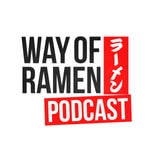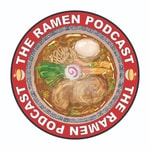Japan Eats! – Details, episodes & analysis
Podcast details
Technical and general information from the podcast's RSS feed.

Japan Eats!
Heritage Radio Network
Frequency: 1 episode/10d. Total Eps: 370

Recent rankings
Latest chart positions across Apple Podcasts and Spotify rankings.
Apple Podcasts
🇫🇷 France - food
09/07/2025#64🇫🇷 France - food
08/07/2025#57🇫🇷 France - food
07/07/2025#45🇫🇷 France - food
06/07/2025#27🇬🇧 Great Britain - food
01/07/2025#81🇬🇧 Great Britain - food
30/06/2025#58🇺🇸 USA - food
30/06/2025#99🇺🇸 USA - food
29/06/2025#87🇨🇦 Canada - food
19/06/2025#93🇨🇦 Canada - food
18/06/2025#68
Spotify
No recent rankings available
Shared links between episodes and podcasts
Links found in episode descriptions and other podcasts that share them.
See all- http://simplecast.com/
2617 shares
- http://heritageradionetwork.org/donate
2593 shares
- http://simplecast.com
1455 shares
RSS feed quality and score
Technical evaluation of the podcast's RSS feed quality and structure.
See allScore global : 53%
Publication history
Monthly episode publishing history over the past years.
I Bought A Kominka (Vintage House) In Japan
Episode 340
mardi 6 août 2024 • Duration 42:24
Our guest is Hannah Kirshner who is a food stylist and author of Water, Wood, and Wild Things published in 2021. She joined us in Episode #223 to discuss her wonderful book and introduced us to her fascinating life in Yamanaka, a small town in Ishikawa Prefecture, Japan.
Hannah’s connection with Yamanaka has been deepening over time since her first visit in 2015 for a three-month apprenticeship at a sake bar. Then she moved to the town in 2018, fully immersing herself in the local culture through unique experiences, such as working at a sake brewery and carving wood trays with near-extinct ancient techniques.
You can read her book and/or listen to Episode #223 to get to know her deep insight into Japanese culture in detail.
There is no strict definition but generally speaking, Kominka means a residential house over 50 years old with classic value. Like in many other countries, depopulation is becoming an issue in Japan and as a result, vacant houses are abundant nationwide. In other words, in those depopulated areas, you can find Kominka with lots of charms at very reasonable prices. Hannah happened to find a great one in Yamanaka and bought it in 2021. In this episode, we will discuss why Hannah decided to buy an old house in a rural area in Japan, how she found an ideal property, the joy and challenges of renovating the house in an eco-friendly manner, her advice to potential Kominka owners and much, much more!!!
Takoyaki: Another Addictive Japanese Comfort Food
Episode 339
mardi 30 juillet 2024 • Duration 01:01:42
Our guest is Karl Palma, who is the chef and owner of Karl’s Balls based in New York City. His mission is to introduce the soul of takoyaki, which is one of the most beloved traditional comfort foods in Japan, to the world.
Karl joined us in Episode #189 in 2020 and introduced us to the basics of takoyaki. Takoyaki is one of the biggest stars of Japanese summer festivals and it is seasonally timely to delve into the delicious, savory snack with a rich cultural background!
In this episode, we will discuss why the simple bite-size balls are a piece of art, distinctively different styles of takoyaki between Osaka and Tokyo, the upcoming exciting takoyaki festival in Japan that Karl is invited to, and much, much more!
Heritage Radio Network is a listener supported nonprofit podcast network. Support Japan Eats by becoming a member!
Japan Eats is Powered by Simplecast.
Japanese Curry: Unique, Delicious, Super Popular Soul Food
Episode 330
lundi 29 avril 2024 • Duration 51:58
Our guest is Elizabeth Andoh, who already joined us 13 times and shared her truly deep insight into traditional Japanese food culture. Elizabeth is a food writer and Japanese cooking instructor based in Tokyo, and she has lived in Japan for over 50 years. She runs the culinary arts program called A Taste of Culture, which offers a great opportunity for non-Japanese people to explore Japanese culture through its food. Elizabeth is also the author of 6 cookbooks, including the award-winning “Washoku: Recipes from the Japanese Kitchen” and “Kansha: Celebrating Japan's Vegan and Vegetarian Traditions.”
Today’s topic is Japanese curry. Curry is a universally popular dish, but like many other things, Japanese people remodeled the original and created a unique style of their own. Now, Japanese people eat Japanese-style curry as often as every 5 days, and the sales of all curry products totals 100 billion Japanese yen, or 660 million US dollars, annually.
In this episode, we will discuss when and how Japanese people created their distinctively unique style of curry, the difference between Japanese and other styles of curry in the world, how to make a perfect Japanese curry dish at home, and much, much more!!!
-----
THE NOTO PENINSULA EARTHQUAKE DISASTER RELIEF
As you may know, a major earthquake struck Japan's Noto Peninsula in Ishikawa Prefecture on January 1st. The death toll keeps climbing and the damage to the beautiful region is tremendous. Importantly, 10 of the 11 sake breweries in the Noto Peninsula were completely or partially destroyed.
So if you can, please donate through reliable organizations including:
The Japanese Red Cross https://www.jrc.or.jp/english/relief/2024NotoPeninsulaEarthquake.html
Peace Winds America: A fundraiser by US-Japan Foundation/US-Japan Leadership Program https://www.globalgiving.org/fundraisers/49472/
The Ishikawa Sake Brewers Association
https://www.ishikawa-sake.jp/index.php
(the donation account details) https://www.ishikawa-sake.jp/images/97-1.pdf)
Heritage Radio Network is a listener supported nonprofit podcast network. Support Japan Eats by becoming a member!
Japan Eats is Powered by Simplecast.
Sequoia Sake: Reviving 115-Year-Old Sake Rice in San Francisco
Episode 240
lundi 11 octobre 2021 • Duration 54:46
Our guest is Jake Myrick who is the co-owner and toji, or brewmaster, of Sequoia Sake in San Francisco, which was founded in 2015. It is the first local artisanal sake brewery in the city.
In 2019, only 4 years after their first production of sake, the brewery received both the gold and silver awards for best sake produced outside of Japan at the Tokyo Sake Competition.
Jake has been relentlessly pursuing the best quality sake, and as a result, he has successfully revived the original sake rice brought to California from Japan back in 1906 in collaboration with UC Davies and local rice farmers. Now it is called Sequoia Sake Rice.
In this episode, we will discuss how Jake got into sake and ended up opening a sake brewery in America, how sake rice is different from regular table rice, the outstanding quality of the sake rice Jake has revived, Sequioa Sake’s classic and innovative styles of sake, and much, much more!!!
Heritage Radio Network is a listener supported nonprofit podcast network. Support Japan Eats by becoming a member!
Japan Eats is Powered by Simplecast.
The Princess of the Rice Kingdom
Episode 239
lundi 4 octobre 2021 • Duration 49:03
Our guest today is Marie Akizawa, the 6th generation rice merchant Yamadaya Honten in Tokyo, which was founded in 1905.
Rice is a quintessential food in Japanese culture since it started to be produced 3,000 years ago in the country. Japanese people enjoy plain rice like the best part of the meal. Also, Japanese chefs are crazy about their choice of rice. For instance, at a fancy kaiseki restaurant, the last savory course of the menu is often a bowl of shiny plain rice. You would be surprised how much deliciousness is packed in it!
However, rice consumption in Japan has been steadily declining since the 1960s due to the diversifying diet of the people. But Marie is convinced that the future of rice is bright and its potential is huge.
She is certified as a “rice meister” (rice expert) as well as a “kome shokumi kanteishi” (rice sommelier). She actively visits farms she works with and often participates in rice production.
In this episode, we will discuss how essential rice is in Japanese food culture and the people’s mindset, Marie’s innovative and successful strategies to make rice popular again, different flavors of rice depending on the varieties and milling rates, how to enjoy rice at home and much, much more!!!
- Here is how to cook rice at home by Marie Akizawa!
Serves 2:
① Prepare 180g of rice and 200g of water, and a pot with smaller size.
② Put 180g of rice in a bowl and rinse it with water, then drain the water quickly as the rice will absorb first- round water quickly.
③ Add second-round water and stir it gently for about 30 seconds and drain water.
④ Repeat this procedure three times.
⑤ Drain the water completely and put the rice in the pot.
⑥ Add the clear water of 200g and soak the rice in the water for 30 minutes or 1 hour.
⑦ Cover the pot with a lid and heat it until it boils. Then leave it for 2 seconds.
⑧ Turn down the heat to medium low for next 3 minutes, then simmer it with low heat for 5 minutes.
⑨Then turn off the heat and let the cooked rice rest for 10 minutes.
⑩ Gently overturn the rice and briefly stir with a flat wooden spoon to let the steam escape.
⑪ Done!
Heritage Radio Network is a listener supported nonprofit podcast network. Support Japan Eats by becoming a member!
Japan Eats is Powered by Simplecast.
Omotenashi at Café de Flore, Paris
Episode 238
mardi 28 septembre 2021 • Duration 01:05:15
Our guest is Tetsuya Yamashita, the only non-French garçon, or waiter, at Café de Flore in Paris. Café de Flore is one of the most iconic cafes in France. Garçon in France is different from a waiter in the US and Tetsuya exemplifies the difference in his outstanding style of service. To prove how distinctive he is, Tetsuya has been patronized by many regulars including the legendary fashion designer Karl Lagerfeld. Also, he was invited by President François Hollande to the state dinner at the Élysée Palace when Prime Minister Shinzo Abe visited Paris and got seated right next to the famed chef Alain Ducasse.
There is a unique concept of service in Japan called Omotenashi and Tetsuya is practicing the idea of Omotenashi at the quintessential café in Paris.
In this episode, we will discuss how Tetsuya got the job at Café de Flore in Paris and became the top garçon, his philosophy of hospitality, how he keeps refining himself to offer the greatest service possible to his guests, and much, much more!!!
Heritage Radio Network is a listener supported nonprofit podcast network. Support Japan Eats by becoming a member!
Japan Eats is Powered by Simplecast.
Sake Revolution!
Episode 237
lundi 13 septembre 2021 • Duration 36:15
This episode is different from our regular show. Recently, I got very lucky to be on the fantastic podcast Sake Revolution and had a fun conversation with the wonderful hosts Tim Sullivan and John Puma. So I am replaying it today on Japan Eats!
The Sake Revolution podcast started in January 2020 and each episode is so informative and so much fun that I have never missed any episode of the show.
Hope you enjoy it and also I suggest that you listen to more episodes on Sake Revolution, which is available on all major platforms of podcasts as well as on their website sakerevolution.com!
Heritage Radio Network is a listener supported nonprofit podcast network. Support Japan Eats by becoming a member!
Japan Eats is Powered by Simplecast.
Rule of Thirds
Episode 236
jeudi 12 août 2021 • Duration 01:09:21
Our guests today are JT Vuong and George Padilla, the executive chef and the co-founding partner of Rule of Thirds in Greenpoint, Brooklyn in New York. George and JT met at Okonomi, a charming Japanese restaurant in Williamsburg, Brooklyn and after working for several years together, they opened Rule of Thirds in February 2020 – what a timing! It was a month before the outbreak of COVID-19.
But the duo managed to get through the challenges in the pandemic and luckily we can now discover their great new restaurant in person.
In this episode, we will discuss how George and GT got into Japanese food, their ideas of Japanese food culture, how they communicate the ideas at Rule of Thirds through outstanding hospitality and unique dishes, creative programs they offer to enjoy Japanese flavors and much, much more!!!
Image courtesy of Eric Medsker.
Heritage Radio Network is a listener supported nonprofit podcast network. Support Japan Eats by becoming a member!
Japan Eats is Powered by Simplecast.
I Just Opened A Sake Bar By Accident
Episode 235
lundi 2 août 2021 • Duration 54:21
Our guest is Austin Power who has been in the sake industry for the last 17 years as a sake sommelier and kikizakeshi, or a certified sake professional. Austin joined us in Episode 164 and discussed his fascinating experience at Sake Bar Satsuko in the East Village for the first 10 years of his career. Also, he shared his ideas of serving Japanese sake in non-Japanese environments like Tokyo Record Bar in Greenwich Village and Niche Niche in SOHO. He is also a talented artist and graduate of Parsons School of Design.
Austin is joining us today because he recently opened his own fantastic sake bar called Accidental Bar in the East Village, Manhattan (Resy).
In this episode, we will discuss why Austin opened a sake bar in the middle of the pandemic, how Accidental Bar is proposing a new way of drinking sake, the unique sake that he offers at his bar, his food menu that relates to the health benefits of sake (what are they?) and much, much more!!!
Heritage Radio Network is a listener supported nonprofit podcast network. Support Japan Eats by becoming a member!
Japan Eats is Powered by Simplecast.
Discovering Shochu with iichiko
Episode 234
lundi 26 juillet 2021 • Duration 58:02
Our guest is Tetsuro Miyazaki, who is the General Manager at IICHIKO USA. iichiko is one of the most well-known shochu brands in Japan and abroad. The company was founded in 1958 and specializes in barley-based shochu products, which reflects the natural environment of Oita Prefecture in the south of Japan.
iichiko shochu’s nickname is ""Downtown Napoleon"", meaning that it has the quality of the first-class famous brandy Napoleon at an approachable price. And iichiciko has received numerous awards at global stages such as the San Francisco World Spirits Competition and the International Spirits Competition.
In this episode, we will discuss how the taste of shochu is affected by various elements like ingredients, the environment of the distillery and the production philosophy, how to drink shochu, great food pairings with shochu and much, much more!!!
Heritage Radio Network is a listener supported nonprofit podcast network. Support Japan Eats by becoming a member!
Japan Eats is Powered by Simplecast.









